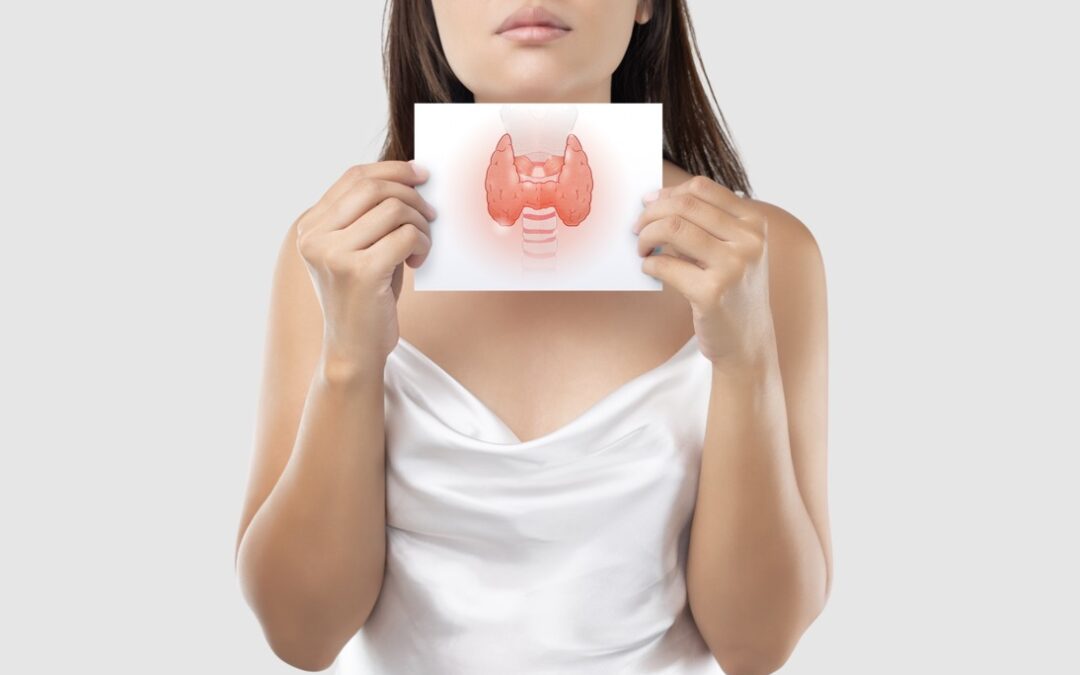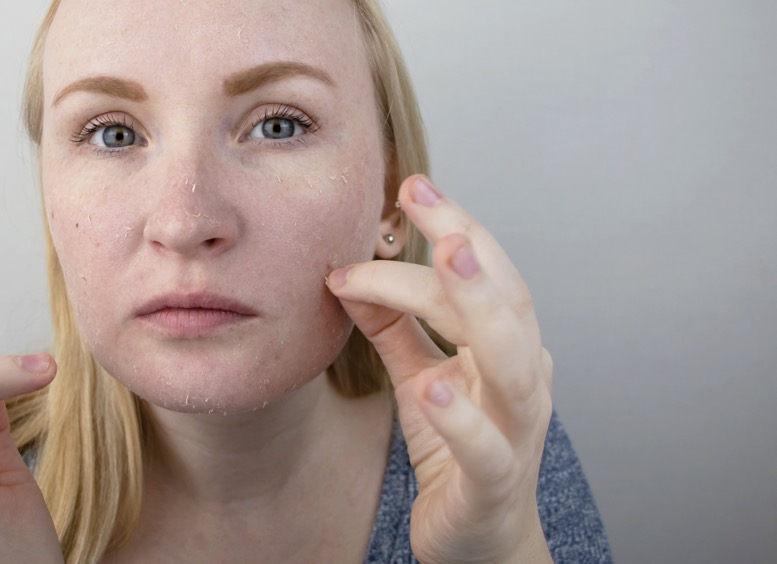The link between hypothyroidism and acne
Hormonal imbalances are a key driver of acne. Androgens hog the limelight, but both clinical and subclinical thyroid dysfunction is detrimental to skin health. This article explores how thyroid disease contributes to acne, who might be most at risk and what to consider for testing.
The role of the thyroid in the skin and acne
Sebum regulation
Sebum is the major component of skin lipids. Excess sebum is part of acne pathogenesis, but like many other body processes, we need a happy medium – not too much, not too little.
An under-functioning thyroid lowers sebum output. This can lead to dry, easily irritated skin and infections. Sebum protects against UV light damage and reduces the risk of hyperpigmentation. Sebum also contains natural antimicrobial peptides, which help keep acne-causing bacteria in check.
Sex hormone production
Progesterone
The ovaries need the active thyroid hormone triiodothyronine (T3) to produce progesterone. Sufficient progesterone in the second half of the menstrual cycle (luteal phase) keeps androgens in check.
The progesterone metabolite (allopregnanolone) is calming to the brain. It’s like your natural Valium! This soothing effect can help reduce stress and promote deep sleep – two other acne triggers.
Sex hormone-binding globulin (SHBG)
Dysregulation of the thyroid will reduce SHBG. As the name suggests, SHBG locks up hormones, specifically androgens, so they can’t activate receptors. (It’s one of the ways birth control pills work for acne – they increase SHBG fourfold.)
Autoimmune thyroid conditions
Autoimmune thyroid conditions like Hashimoto’s or Graves disease raise proinflammatory immune molecules (cytokines like IL-1B), which have a knock-on effect for inflammation in the sebaceous glands.
Glucose and insulin dysregulation
Thyroid dysfunction creates elevated blood and insulin resistance. Insulin dysregulation, in turn, leads to high inflammation, liver dysfunction and elevates androgens. These all contribute to breakouts.
Who is at most risk from thyroid acne?
Investigate the thyroid as a contributing cause of your acne if you have any of the following.
- Polycystic ovarian syndrome (PCOS)
Thyroid dysregulation contributes to insulin resistance and inflammation that drives PCOS. Often subclinical hypothyroidism or Hashimoto’s is present with PCOS.
- A family history of thyroid disorders.
- Have other autoimmune conditions.
- Are you transitioning through perimenopause?
With ageing, there is a general decline in the power of the thyroid gland to uptake iodine, a vital nutritional building block for thyroid hormones. The fluctuating estrogen levels in perimenopause alter the thyroid gland’s ability to produce T3 and thyroxine (T4). It also impacts thyroid hormone receptor function.
- Pregnancy and Post-partum acne
Creating little humans can trigger thyroid dysfunction due to changes in the maternal immune system and nutrient depletions from pregnancy and breastfeeding.
- Have you been previously prescribed antibiotics for your acne
Tetracycline antibiotics like minocycline are often prescribed to treat acne. These may trigger non-autoimmune thyroiditis and autoimmune thyroid conditions in some individuals.
- Have Euthyroid Sick Syndrome
This may occur in people who have had periods of critical illness, major surgery or experienced an extended period of caloric restriction. The pattern on a thyroid test will be normal TSH & T4 with decreased T3.
How to figure out if your thyroid is involved in your acne
Skin signs and symptoms of thyroid disorders
Skin, hair and nail signs can appear as early warning signs of thyroid issues. Further investigations could be warranted if you tick a few of these boxes. Here are some things to look out for.
- Cold and mottled skin
- Skin will be dry. Dryness is a keynote for under-functioning thyroid as the thyroid is involved in sebum secretion.
- The epidermis is thin, rough and hyperkeratotic (scaly)
- Brittle hair, ridged nails, break easily.
- Fine wrinkles with a parchment-like quality
- Yellow/orange tint on palms and soles of feet but not sclera (whites of eyes)
This is due to the reduced ability of the liver to convert beta-carotene in foods like carrots and sweet potatoes to Vitamin A. The betacarotene deposits in the stratum corneum of the skin.
**You can also get this if you eat lots of high beta carotene foods, so it’s not always a sign of thyroid dysfunction.
Other thyroid symptoms
Read this article to get more detail on thyroid signs and symptoms.
Investigations and thyroid testing
Testing is essential to determine if thyroid dysfunction exists.
Thyroid tests
A thyroid stimulating hormone test (TSH) is a first-line thyroid test used by doctors. If this comes back in the lab reference range, you’ll often be told your thyroid is fine. However, there can be more going on than this test reveals.
It is possible to have a normal range TSH with low or suboptimal T3, T4 and elevated thyroid antibodies.
Also, the lab reference range for TSH is around 0.3 – 3.5 mIU/L, but an ideal functional TSH range is 0.3-2.5mIU/L.
If thyroid dysfunction is strongly suspected, a thyroid panel with TSH, T4, T3 and thyroid antibodies provides a more comprehensive picture. Medicare in Australia may not cover this, but you can choose to pay “out of pocket” for it.
Other investigations
Depending on the suspected underlying cause, it could also be helpful to test for the following.
- Vitamin D
- Selenium
- Iodine
- Zinc and Copper
What to do about it?
Usually, in my articles, I like to provide some tips to provide a starting point for treatment, but the thyroid pathology and treatment are complex. Supplementing the wrong nutrients and herbs or incorrect dosages can make matters worse.
I recommend working with an experienced practitioner to address your situation holistically.
Of course, the foundations of healthy eating, regular movement, managing stress and getting plenty of sleep are fantastic places to start while you figure out the details.
If you are in Australia and want to know more about acne treatment, book a free 15-minute Discovery Call to find out if 1:1 Naturopathy suits you.
(Unfortunately, I can’t consult with clients outside of Australia due to insurance restrictions.)
If you enjoyed this article, you might also like:
Thyroid disease – signs, symptoms and causes
Acne – Discover the underlying cause
Is leaky gut causing your acne?

Need help with
Norelle Hentschel is an experienced naturopath with a clinic in Stones Corner, South East Brisbane and Telehealth consults Australia wide. She has helped many women on their clear skin journey by treating the underlying drivers of acne.
Want more articles like this?
Join us at Your Skin Remedy – the monthly missive for healthy skin from the inside out. Practical, actionable, and informative. Your clear, glowing skin starts here.
PS. Your inbox real estate is precious. Your Skin Remedy is pitch and promo free. I promise. One email a month — that’s it.


